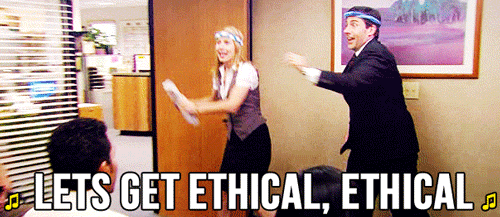Code of Ethics
Conrad Bailey
Breanna Devore-McDonald
Cory Jbara
Steven Mike

1. Don't purposefully hurt others
2. Don't discriminate on the basis of age, race, ethnicity, gender, etc.
3. Contemplate the potential consequences of your code
4. Be willing to accept the ideas of others
5. Do not be afraid to share your ideas
6. Do not abuse the generosity of others, in and out of the industry
7. Stay up to date with current industry trends and innovations
8. Rely on yourself before you rely on others
9. Practice patience with non-technical people
10. Don't intentionally leave bugs in your code
11. Strive to make a positive impact with everything you develop
12. Don't forget your passions when thinking about those fat stacks
13. Respect the privacy of your users (Ashley Madison)
14. Don't be a condescending jackass
15. Use tabs
Personal Reflection
One thing stood out the most when we sat down to actually pound out our Code of Ethics: we kept saying "That's common sense; should we add it?". Some things we did end up adding, like "Don't discriminate", but some things we eventually decided not to, because they were so obvious that we assumed any rational human would already live that way. Aside from that observation, the only other things all four of us were vehemently in agreement upon were rules 14 and 15: "Don't be a condescending jackass" and "Use tabs". All of us have experienced those people who peacock...
Def. To Peacock (verb): to show off your knowledge in a condescending and
patronizing way, even if said knowledge is not that knowledgeable
So, we assumed that particular point wasn't common sense, so we made sure to add it. Additionally, we all thought people who use spaces are dumb (hypocritical...? nah), so we also made sure to add that in our Code.
The most interesting rule in our Code, in my opinion, is "Do not abuse the generosity of others." Open source is a big part of my work and my interests, and I think the open source world is a key component in the persona of the computing industry. I think a lot of us, as CS undergrads, take advantage of the open source world or do not give it as much attention as we should, so I'm glad it made its way into our Code of Ethics.
I definitely think there are weaknesses here, mainly because creating a list of
rules for an entire industry is impossible. There's no way we (or anyone, for
that matter) could create a document that covers every edge case, every
blurred line, every gray area in the field. We tried to lump everything
together in "contemplate the potential consequences of your code", but we still
feel that that leaves things out. Even though some things are left out, I think
that sitting down and discussing these problems is 100% valuable to our
introspections about our field. Does the value come from the actual code? No...
I think the value comes from the discussion between my peers and I. We talked
about the issues we each see, and we shared our own unique perspectives. I think
that's the most important part of this class: seeing the world through
a different pair of eyes.